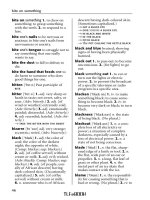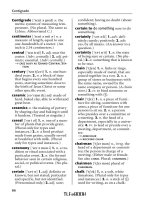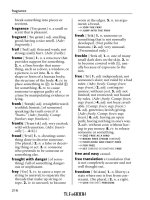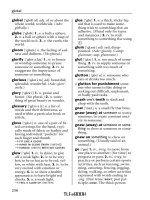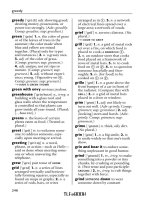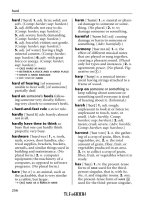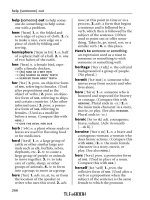NTCs pocket dictionary of words and phrases
Bạn đang xem bản rút gọn của tài liệu. Xem và tải ngay bản đầy đủ của tài liệu tại đây (4.54 MB, 752 trang )
NTC’s
pocket
DICTIONARY
Of words
and phr ases
This page intentionally left blank.
NTC’s
pocket
DICTIONARY
Of words
and phr ases
12,000 Words, Idioms, and
Phrasal Verbs for Travelers
and Learners
Editor-in-Chief
Richard A. Spears, Ph.D.
Chicago New York San Francisco Lisbon London Madrid Mexico City
Milan New Delhi San Juan Seoul Singapore Sydney Toronto
Copyright © 2002 by The McGraw-Hill Companies, Inc. All rights reserved.
Manufactured in the United States of America. Except as permitted under the United
States Copyright Act of 1976, no part of this publication may be reproduced or distributed in any form or by any means, or stored in a database or retrieval system, without the prior written permission of the publisher.
0-07-143405-4
The material in this eBook also appears in the print version of this title: 0-65801700-4.
All trademarks are trademarks of their respective owners. Rather than put a trademark symbol after every occurrence of a trademarked name, we use names in an
editorial fashion only, and to the benefit of the trademark owner, with no intention
of infringement of the trademark. Where such designations appear in this book,
they have been printed with initial caps.
McGraw-Hill eBooks are available at special quantity discounts to use as premiums
and sales promotions, or for use in corporate training programs. For more information, please contact George Hoare, Special Sales, at or (212) 904-4069.
TERMS OF USE
This is a copyrighted work and The McGraw-Hill Companies, Inc. (“McGrawHill”) and its licensors reserve all rights in and to the work. Use of this work is subject to these terms. Except as permitted under the Copyright Act of 1976 and the
right to store and retrieve one copy of the work, you may not decompile, disassemble, reverse engineer, reproduce, modify, create derivative works based upon,
transmit, distribute, disseminate, sell, publish or sublicense the work or any part of
it without McGraw-Hill’s prior consent. You may use the work for your own noncommercial and personal use; any other use of the work is strictly prohibited. Your
right to use the work may be terminated if you fail to comply with these terms.
THE WORK IS PROVIDED “AS IS”. McGRAW-HILL AND ITS LICENSORS
MAKE NO GUARANTEES OR WARRANTIES AS TO THE ACCURACY,
ADEQUACY OR COMPLETENESS OF OR RESULTS TO BE OBTAINED
FROM USING THE WORK, INCLUDING ANY INFORMATION THAT CAN
BE ACCESSED THROUGH THE WORK VIA HYPERLINK OR OTHERWISE,
AND EXPRESSLY DISCLAIM ANY WARRANTY, EXPRESS OR IMPLIED,
INCLUDING BUT NOT LIMITED TO IMPLIED WARRANTIES OF MERCHANTABILITY OR FITNESS FOR A PARTICULAR PURPOSE. McGraw-Hill
and its licensors do not warrant or guarantee that the functions contained in the
work will meet your requirements or that its operation will be uninterrupted or error
free. Neither McGraw-Hill nor its licensors shall be liable to you or anyone else for
any inaccuracy, error or omission, regardless of cause, in the work or for any damages resulting therefrom. McGraw-Hill has no responsibility for the content of any
information accessed through the work. Under no circumstances shall McGrawHill and/or its licensors be liable for any indirect, incidental, special, punitive, consequential or similar damages that result from the use of or inability to use the
work, even if any of them has been advised of the possibility of such damages. This
limitation of liability shall apply to any claim or cause whatsoever whether such
claim or cause arises in contract, tort or otherwise.
DOI: 10.1036/0071434054
Contents
Introduction
vii
How to Use This Dictionary
Useful Spelling Rules
xi
Lists of Words
xvii
Abbreviations and Symbols
Pronunciation
xxxii
Entries
1
ix
xxxi
.
v
This page intentionally left blank.
Introduction
NTC’s Pocket Dictionary of Words and Phrases is for persons
who are seeking to improve their ability to speak, read, write,
and understand American English. It is a small, portable dictionary that will help learners with spelling, pronunciation,
parts of speech, meaning, irregular forms, and the appropriate use of 12,000 common words and phrases.
This dictionary defines words using the smallest possible
vocabulary, but when it is necessary, additional words are used
to define difficult concepts. In many cases, more than one definition is given, so the learner has additional help in figuring
out the meaning of a word or expression.
Phrases are entered in the dictionary in their normal alphabetical positions. Phrases are also indexed within the dictionary by means of cross-references. A cross-reference to each
phrase is found at the entry of each non-initial, major word
in the phrase. Thus, after account we find the cross-references:
→ cook the accounts
→ give a good account of oneself
→ savings account
→ turn something to good account
These cross-references enable a reader who can’t remember an exact phrase to find it just by looking up one of the
phrase’s key words.
.
vii
This page intentionally left blank.
How to Use This Dictionary
Many of the entry words in the dictionary have more than one
sense. Please study all the relevant senses to make sure you have
found the right one.
Nominals (n.) that do not follow the regular spelling or
pronunciation rules in the formation of the plural are marked
irreg., and the form of the plural is given in the entry. Verbs
(tv., iv.) that do not follow the regular rules for the formation
of the past tense and past participle are marked irreg., and the
proper forms are given in the entry. The comparative and
superlative forms of adjectives (adj.) and adverbs (adv.) are
listed when there are forms—as with red, redder, reddest—that
replace, or that exist in addition to, the comparatives and
superlatives formed with more and most. After many of the
definitions, you will find comments, enclosed in parentheses,
containing further information about the entry word.
Keep in mind that the goal in using a monolingual learner’s
dictionary is not only to find the meanings of specific words,
but also to develop the skills needed to acquire new words and
senses of words from their actual use in context.
.
ix
This page intentionally left blank.
Useful Spelling Rules
The following basic spelling rules equip the learner to create
and identify the most important derived and inflected forms
of regular English nouns and verbs.
Words that have important irregular forms that do not follow these rules are identified in the dictionary.
Regular Verb Forms
Note: Many verbs that have irregular past-tense forms or
irregular past participles nevertheless form the present tense
and the present participle regularly.
For the third-person singular (the form used with he, she, it,
and singular nouns) in the present tense:
■ Add -s to the bare verb. If the bare verb ends in y preceded
by a consonant, change y to ie and then add -s. If the bare
verb ends in s, z, x, ch, or sh, add -es.
like > Bill likes
cry > the baby cries
walk > Anne walks
buy > the man buys
carry > a truck carries
fix > she fixes
pass > it passes
notify > he notifies
catch > she catches
.
xi
Useful Spelling Rules
For the past tense and the past participle:
■ Add -ed to the bare verb. If the bare verb ends in y preceded
by a consonant, change y to i before adding -ed. If the bare
verb ends in e, just add -d.
walk > walked
like > liked
judge > judged
try > tried
carry > carried
measure > measured
For the present participle:
■ Add -ing to the bare verb. If the bare verb ends in a single
e preceded either by a consonant or by u, drop the e before
adding -ing. If the bare verb ends in ie, change ie to y before
adding -ing.
judge > judging
take > taking
ask > asking
carry > carrying
pay > paying
pursue > pursuing
hoe > hoeing
see > seeing
go > going
lie > lying
xii
Useful Spelling Rules
Doubling of consonants in participles and past-tense forms:
■ When -ed or -ing is added to a word that ends in a consonant (other than h, w, x, or y) preceded by a single vowel,
and the final syllable is stressed, then the consonant is
normally doubled. Thus commit and control, which are
accented on the last syllable, become committed and controlling, but limit and cancel, which are accented on the first
syllable, become limited and canceling. Similarly, stop
becomes stopping, but look, in which the consonant is preceded by two vowels, becomes looking.
Within the dictionary, forms that do not follow these
doubling rules are noted in individual entries. The most typical exceptions to the doubling rules are words with a final c
that becomes ck rather than doubling, e.g., picnicking, verbs
that are compounds, and verbs with closely related noun
senses or more than one pronunciation. Outside the dictionary, learners will encounter other exceptions, as well as
some variation, because sometimes another option, although less familiar in American English, is also correct.
Regular Noun Plurals
To form the plural of a regular noun:
■ If the singular form ends in s, z, x, ch, or sh, add -es.
kiss > kisses
box > boxes
match > matches
dish > dishes
bus > buses
xiii
Useful Spelling Rules
■ If the singular form ends in y preceded by a consonant,
change y to ie and then add -s.
baby > babies
library > libraries
university > universities
butterfly > butterflies
■ For nouns ending in o, the regular plural form may be
formed by adding -es or by adding -s. For some words, both
spellings are possible. In this dictionary, each entry for a
noun ending in o specifies the correct plural form or forms
for that word.
radio > radios
potato > potatoes
tornado > tornados or tornadoes
■ For all other regular nouns, add -s to the singular form to
make the plural.
table > tables
boy > boys
television > televisions
valley > valleys
An Important Note on the English Plural
The English plural is something that makes English very difficult for adults to learn. English nouns often cannot be made
plural, unlike their counterparts in other languages. There is
nothing that sounds more “non-English” than advice, inforxiv
Useful Spelling Rules
mation, or baggage with the plural s on the end. There are
many American English nouns in this dictionary that the
learner should not attempt to make plural—ever! See a list of
these nouns in List A on page xvii. In addition, there are many
nouns in English that can be followed by the plural s that seem
to be plural, but really refer to kinds or types of the noun in
question. In the following entry, when the word margarine has
an s on the end, it refers to different kinds, types, or varieties
of margarine.
margarine ["mar dZ@ rIn] n. a food made
from animal or vegetable fats, used in
place of butter; a spread for bread.
(Plural only for types and instances.)
There are many American English nouns that can take
the plural s while only referring to different kinds, types,
instances, or varieties of the noun. See them in List B on page
xx.
xv
This page intentionally left blank.
Lists of Words
These are important lists of words that can be consulted
quickly. For further information, definitions, and examples,
each word should be looked up in this dictionary.
List A
Nouns defined in this dictionary that never take the plural s.
See the entry heads listed for details.
admiration
advice
anybody
anyone
anything
applause
appreciation
Arctic
arrogance
assistance
attendance
aviation
awe
baggage
bathwater
blackness
bliss
bloodshed
bookkeeping
bowling
bulk
carelessness
cash
Catholicism
cattle
chaos
chatter
chess
citizenship
clothing
common
sense
confusion
consent
conservation
contempt
courage
cowardice
cream cheese
dark
darkness
daybreak
daylight
decay
destruction
devout
digestion
diplomacy
dirt
disgust
dishwater
distress
distrust
drainage
dust
ease
east
electricity
elegance
employment
endurance
equipment
esteem
estimation
evidence
excellence
fame
few
filth
flesh
former
freight
frostbite
fun
furniture
fuzz
glamour
gloom
golf
gratitude
greed
grief
grime
ground beef
guilt
happiness
health
hockey
homework
housework
hypnotism
ill will
.
xvii
Lists of Words
importance
independence
indigestion
information
insurance
intelligence
interference
isolation
jazz
jet propulsion
jewelry
knowledge
laughter
law of gravity
leakage
left
legislation
leisure
lighting
lightning
likelihood
lint
literacy
livestock
logic
loot
luck
luggage
machinery
magic
magnetism
maintenance
malice
mankind
math
xviii
mayonnaise
menstruation
merchandise
Midwest
might
mirth
misconduct
mistrust
moderation
moisture
molasses
moonlight
morale
morality
more
most
motherhood
much
mucus
nausea
needlework
neglect
nightlife
nonsense
north
northeast
northwest
nothing
now
nutrition
obedience
occult
offspring
old age
ooze
opposition
outer space
overkill
overtime
ownership
oxygen
ozone
pantyhose
paradise
parcel post
parsley
participation
patience
peace
pep
perfection
perjury
personnel
persuasion
petroleum
photography
pity
plenty
plumbing
poetry
police
poor
pork
postage
poultry
poverty
precision
preservation
prevention
prey
produce
progress
propaganda
prose
prosperity
prudence
psychiatry
psychology
publicity
punctuation
quickness
quiet
racism
rapidity
readiness
real estate
realism
reasoning
recklessness
recognition
recreation
redness
refuse
rejoicing
relief
research
revenge
ridicule
rot
rubbish
rudeness
running
rust
sadness
safekeeping
Lists of Words
safety
salt water
sameness
sanitation
sanity
sarcasm
say
scenery
schoolwork
science
scrutiny
scuba
seafood
seaside
seclusion
secrecy
segregation
selfconfidence
self-control
self-discipline
self-esteem
self-respect
self-service
selfishness
senility
seniority
serenity
seriousness
several
severity
sewage
sewing
sexual
intercourse
shame
shelving
shipping
shopping
shrewdness
shrubbery
shyness
sightseeing
significance
silver
silverware
simplicity
sincerity
sizzle
skepticism
skiing
slander
slavery
sleep
sleet
slime
slow motion
slush
small talk
smuggling
soccer
social security
software
some
something
sorcery
south
southeast
southwest
spaghetti
starvation
static
stationery
storage
strife
stuff
stupidity
sunlight
sunshine
supervision
surf
suspense
tact
teamwork
tennis
terrorism
thunder
tourism
traction
traffic
transportation
trash
twilight
underclothing
underwear
undoing
unrest
upkeep
uranium
valor
vanilla
veal
vegetation
vigor
violence
vomit
warmth
wastepaper
wealth
wealthy
wear
weather
welfare
west
wetness
wilderness
willpower
wisdom
woodwork
worship
worth
wrath
wreckage
young
zeal
zest
zinc
xix
Lists of Words
List B
Nouns defined in this dictionary that can take the plural s
resulting in the meaning “kinds, types, instances, or varieties
of.” See the entry heads listed for details.
action
addition
adhesive
adoption
adventure
agony
alcohol
amputation
appointment
architecture
ash
bacon
bait
ballet
bark
beer
behavior
bleach
blue
brass
bronze
broth
brown
butter
buzz
cake
cancer
candy
canvas
xx
caramel
cardboard
cargo
cement
cereal
chalk
champagne
change
charcoal
charm
cheese
cherry
chocolate
choice
cider
clay
cleaner
cloth
coal
coffee
combination
comparison
concern
confession
conflict
conquest
contraction
conversation
copulation
cord
cork
cost
cotton
court
crime
cruelty
crystal
debt
defense
denial
depth
destiny
detention
dew
difference
difficulty
dip
disagreement
discipline
discomfort
disgrace
division
divorce
dough
duck
dynamite
elm
enjoyment
escape
evaluation
evil
examination
explanation
exposure
fabric
failure
fantasy
fashion
fat
fate
fear
feed
felt
fiber
fiction
film
fire
flight
flour
flu
foam
foil
food
force
friendship
frost
frosting
Lists of Words
fruit
fur
future
gas
gasoline
gauze
glass
glue
gold
grain
grammar
grass
gravel
gravy
gray
green
gum
ham
harmony
honey
horror
hurt
identification
immersion
increase
indentation
infection
influence
injection
ink
inspection
intensity
irritation
ivy
jam
jelly
juice
ketchup
landscape
language
leather
length
liquor
lotion
loyalty
lubrication
luxury
marble
margarine
meal
meat
meatloaf
medicine
membership
mesh
metal
meter
mileage
misfortune
mold
mortar
moss
motion
mousse
movement
mulch
mustard
mystery
mythology
noise
notepaper
novelty
number
oak
oil
opinion
orange
pain
paint
pardon
passion
pasta
paste
pastry
payment
pecan
pepper
performance
perfume
philosophy
pick
pie
pigment
pine
pink
pitch
pizza
plaster
plastic
pleasure
poison
polish
pollen
popcorn
poplar
posture
powder
power
prejudice
primer
privilege
prohibition
promotion
pronunciation
prophecy
protection
pudding
purple
quarantine
race
reality
rebellion
red
redwood
regularity
regulation
religion
repetition
resignation
responsibility
rhythm
rice
rope
routine
sacrifice
salt
sand
sandpaper
satin
satisfaction
xxi
Lists of Words
sauce
scripture
seaweed
separation
shampoo
sherbet
shortening
silk
sin
skin
smell
soap
soil
soup
speculation
speed
stain
starch
stew
stock
stone
stool
stress
substitution
subtraction
success
sugar
sunblock
sunburn
sunscreen
syrup
tape
taste
tea
technology
tension
terror
theft
theology
theory
thread
tile
tissue
tobacco
toil
toothpaste
torment
tradition
translation
triumph
twine
use
utterance
vacation
vaccination
variation
variety
varnish
velocity
velvet
victory
volume
walnut
war
wax
whiskey
white
wine
wood
wool
worry
yeast
yellow
List C
Nouns defined in this dictionary that have irregular or variable plurals. Plural variants are separated by “/ ”. The asterisk
“ * ” means there is a unique feature of pronunciation. See the
entry heads listed for details.
aircraft > aircraft
antenna > antennas/antennae
aquarium > aquaria/aquariums
basis > bases
bath*
beaver > beaver/beavers
bookshelf > bookshelves
xxii
booth*
buffalo > buffalo/buffalos/
buffaloes
cactus > cactuses/cacti
calf > calves
chairman > chairmen
child > children
Lists of Words
cloth*
cod > cod
courthouse*
craftsman > craftsmen
crisis > crises
deer > deer
die > dice
doghouse*
dwarf > dwarves/dwarfs
elf > elves
elk > elk/elks
emphasis > emphases
fish > fish
fisherman > fishermen
focus > focuses/foci
foot > feet
footpath*
formula > formulae/formulas
fowl > fowl/fowls
fungus > funguses/fungi
gentleman > gentlemen
goldfish*
goose > geese
grandchild > grandchildren
greenhouse*
half > halves
hippopotamus >
hippopotamuses/
hippopotami
hoof > hooves
house*
index > indexes/indices
knife > knives
leaf > leaves
life > lives
lighthouse*
loaf > loaves
man > men
medium > mediums/media
mink > mink/minks
moose > moose
moth*
mouse > mice/(computer)
mouses
mouth*
nucleus > nuclei
oasis > oases
oath*
octopus > octopuses/octopi
ox > oxen
parenthesis > parentheses
path*
penthouse*
perch > perch
policeman > policemen
policewoman > policewomen
radius > radiuses/radii
rhinoceros >
rhinoceros/rhinoceroses
salesman > salesmen
salesperson >
salespeople/salespersons
saleswoman > saleswomen
salmon > salmon
scarf > scarves
schoolchild > schoolchildren
sheath*
sheep > sheep
shelf > shelves
shellfish > shellfish
xxiii
Lists of Words
shrimp > shrimp/shrimps
sister-in-law > sisters-in-law
snowman > snowmen
sole > sole
sportsman > sportsmen
thief > thieves
tooth > teeth
tree house*
trout > trout
tuna > tuna/tunas
warehouse*
washcloth*
wharf > wharves
wife > wives
wolf > wolves
woman > women
wreath*
yen > yen
zebra > zebra/zebras
List D
Transitive verbs defined in this dictionary that can take a
clause beginning with that as an object. (As with I know that
you can do it!) These verbs can also take other forms of direct
object. See the entry head listed for details.
accept
admit
advertise
advise
announce
answer
anticipate
appreciate
argue
ask
assume
believe
calculate
claim
confess
xxiv
confirm
consider
decide
declare
demand
deny
determine
detest
discover
dream
establish
estimate
expect
explain
feel
find
foresee
forget
guarantee
guess
hear
imagine
indicate
know
learn
legislate
maintain
mention
murmur
note

